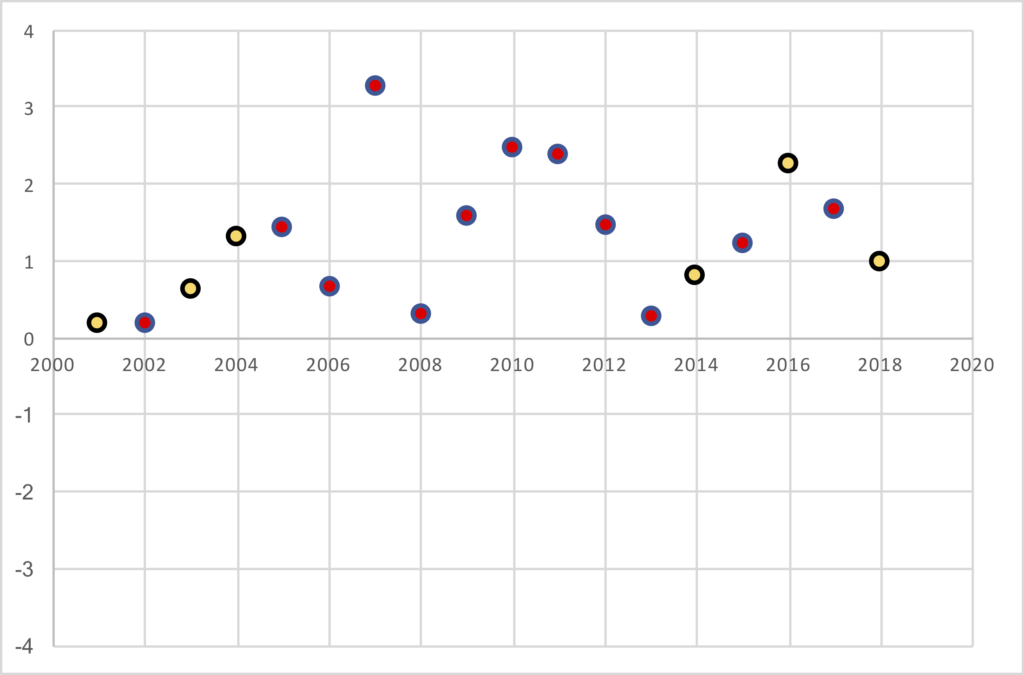Over the last two days, I have argued that the value of a top passing offense is lower than it used to be. One natural counter to that might be, hey Chase, haven’t you noticed that Tom Brady and the Patriots tend to always win the Super Bowl?
But that’s not exactly as convincing an argument as you might think. The Patriots won the Super Bowl in 2014, 2016, and 2018. And let’s be super clear about what I’m saying: I am not saying that quarterbacks are not critical, just that they are less critical than they used to be! From 1958 to 1979, the team that won the NFL championship or Super Bowl had a Hall of Fame quarterback in all but two of those seasons.
So yes, Tom Brady may be winning Super Bowls, but that’s hardly evidence that quarterbacks matter more than ever. Especially when you consider that Brady being at his best has borne little relation to whether or not the Patriots win the Super Bowl.
The graph below shows the Patriots passing offense in each season from 2001 to 2018, measured by New England’s Adjusted Net Yards per Attempt average minus league average ANY/A. Yes, New England has had an above-average passing offense each year. The team has won 6 Super Bowls, and those dots are in gold and black.
 Tom Brady had his first dominant statistical season in 2007; ignoring the injured ’08 campaign, that gives us 11 Brady seasons from ’07 to 18. The Patriots won three Super Bowls during this period, but two of the three were during two of the three worst passing seasons the team has had! If having a great quarterback was more important than ever, the Patriots would have won a Super Bowl in 2007 or 2010 or 2011, and not in 2014 or 2018. It’s easy to say “Tom Brady won” but these were — at least during the regular season — lesser versions of Brady and/or the Patriots offense.
Tom Brady had his first dominant statistical season in 2007; ignoring the injured ’08 campaign, that gives us 11 Brady seasons from ’07 to 18. The Patriots won three Super Bowls during this period, but two of the three were during two of the three worst passing seasons the team has had! If having a great quarterback was more important than ever, the Patriots would have won a Super Bowl in 2007 or 2010 or 2011, and not in 2014 or 2018. It’s easy to say “Tom Brady won” but these were — at least during the regular season — lesser versions of Brady and/or the Patriots offense.
And don’t forget about the intervening seasons: In 2017, the Eagles won the Super Bowl with a backup quarterback in Nick Foles. In 2015, the Broncos won the Super Bowl with Peyton Manning, yes, but this was really the ghost of Manning. Denver ranked in the bottom 3 of ANY/A that season! If quarterback play mattered more than ever, neither of those events would have been likely to happen.
In 2013, the Seahawks won the Super Bowl with a second-year quarterback drafted in the third round. It was Russell Wilson, of course, but the immediate success of college quarterbacks shows that it’s easier than ever to play quarterback, making top quarterback play less scarce. And in 2012, Joe Flacco led the Ravens to the Super Bowl.
But these are isolated examples, so let’s take a more wholesome look. The graph below shows the Relative ANY/A — that is, the Adjusted Net Yards per Attempt average for a team minus league average — for each of the Super Bowl (or NFL Championship Game, for pre-1966) winners and losers. The winners are represented by black dots, the losers by red dots.
If passing was more important than ever, we might expect to see an increase in where the dots are: they would be higher on the graph, because the teams that are best at passing are winning more often. But that’s not the case:

The four worst passing teams to win the Super Bowl are the 2015 Broncos (-1.12 RANY/A), 2000 Ravens (-0.89 RANY/A), 1974 Steelers (-0.81), and 2007 Giants (-0.74). And none of the top 10 passing teams to win the Super Bowl have happened since 2000! The 11th team is Peyton Manning’s other Super Bowl team, the 2006 Colts (+2.53 ANY/A).
So what does this all mean? Passing is really important, but it’s always been really important. Quarterbacks pass more often now than ever, but passing efficiency has always (1) been much more important than passing quantity, and (2) been really important! The 1971 Cowboys ranked 14th out of 26 teams in pass attempts and 2nd in rushing attempts. But Dallas won the Super Bowl not because they were a running team, but because Roger Staubach averaged 7.81 ANY/A that season (and was great in the playoffs) when the league average was just 3.93. The NFL was a very different game back then, but the great passing teams — just like now — were the ones that had the best chances of winning the Super Bowl.
